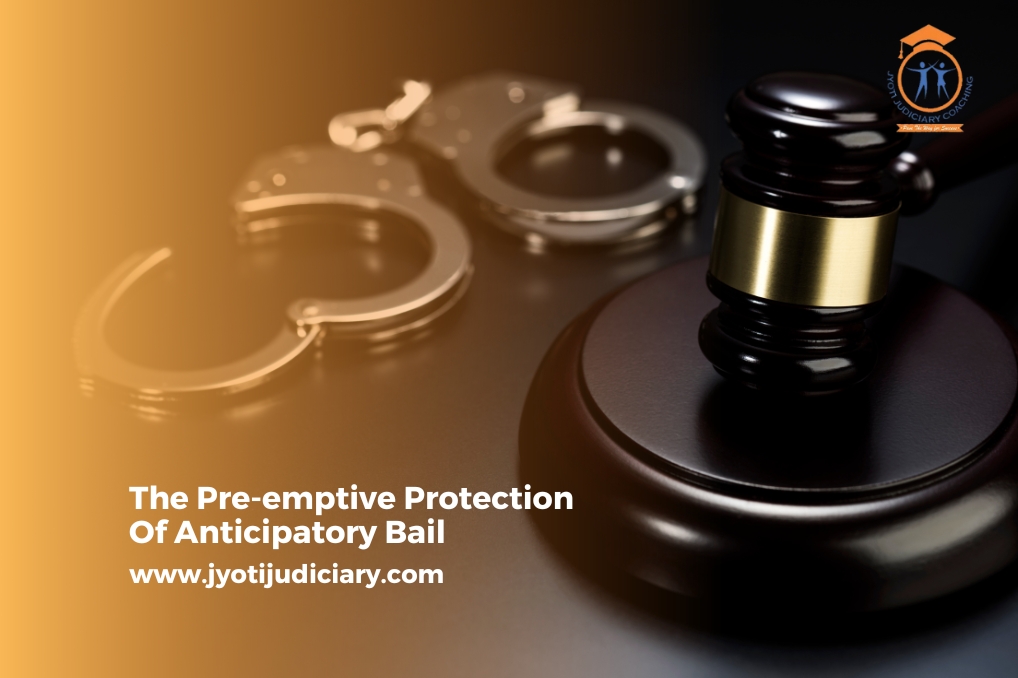
The concept of anticipatory bail is a protection against probable injustices and arbitrary deprivation of freedom in the domain of criminal law. As a legal safeguard, it protects individuals from the danger of arrest while making sure they aren’t detained on baseless or unjustified allegations. Anticipatory bail’s pre-emptive character enables individuals to request protection before being arrested, maintaining the essential principles of justice as well as the process.
Anticipatory Bail
- Section 438 of the Criminal Procedure Code is the anticipatory bail section.
- As per anticipatory bail meaning, it is designed to protect someone who has been wrongfully accused or charged, usually because of professional or personal animosity. It guarantees the release of the wrongly accused individual before they are even taken into custody.
- An applicant needs to appear before the Sessions Court or the High Court, mention Criminal Procedure Code section 438, and present a convincing argument to be granted anticipatory bail.
- Bail is granted if the court determines that the petition has merit based on a variety of factors and the circumstances of the case. Therefore, if the subject is taken into custody, they will be promptly freed under the terms of the anticipatory bail.
Anticipatory Bail Procedure
When FIR is not Filed:
- After filing a formal complaint, the investigating officer will issue an arrest notice.
- As soon as this notice is received, the same process outlined above should be followed to apply for anticipatory bail.
When FIR is Filed:
- The concerned police officer will speak with the public prosecutor.
- The prosecution would believe that there are no grounds to grant anticipatory bail as no formal complaint has been filed.
- The lawyer will ask the judge to revoke the anticipatory bail verbally if the judge grants this request.
- The lawyer will then orally request a seven-day pre-arrest notice if the police decide to arrest you or a member of your family.
- This plea is likely to be accepted by the judge.
- In line with that, an order will be passed. Usually, this is termed as the “notice bail.”
- You may apply with the High Court if the bail request is denied.
- Should the bail be denied by the High Court as well, one may petition the Supreme Court.
498a Anticipatory Bail
Anticipatory Bail 498a before FIR
- If the circumstances allow it, the Session Court may additionally award a pre-arrest notice of seven days, or five days, before the filing of a formal complaint.
- To prevent an unexpected arrest, the police officer will hence give a written notice before using any coercive action.
- Following receipt of this notification, the individual may then apply to the court for anticipatory bail once more.
Anticipatory Bail 498a after FIR
- The first step in filing a 498a case is to get anticipatory bail for every person included in the complaint.
- A request for anticipatory bail is made following Cr. P.C section 438.
- Both the Session Court and the High Court may hear the case, but it is best to submit for anticipatory bail before the Session Court.
- If the Session Court denies your request for anticipatory bail, you should then apply with the High Court.
Anticipatory Bail after Chargesheet Supreme Court
In Satender Kumar Antil v Central Bureau of Investigation, which was decided on October 7, 2021, the Supreme Court of India established guidelines for granting bail after the filing of a charge sheet and ruled that trial courts are not prohibited from doing so in light of the accused’s actions during the investigation.
The following prerequisites must be met for these directions to be applicable:
- Under inquiry, the accused is not taken into custody.
- The accused has complied with all requests for cooperation from the investigating officer, including making frequent appearances in person.
Anticipatory Bail in Domestic Violence Case
In situations involving domestic violence, the court may decide to issue anticipatory bail based on the particular facts.
- Severity of the Case: The severity of the domestic violence claims and the quality of the evidence used against the accused will be considered by the court. The court may be more likely to grant anticipatory bail if it finds the allegations to be weak or unfounded.
- Nature of Offence Committed: The type and extent of the claimed domestic violence incidents will be evaluated by the court. It may be more likely that anticipatory bail will be granted if the accused offense is not extremely serious.
- Protection of Complainant: The complainant, who is a victim of domestic violence, will also have their safety and well-being taken into account by the court. The court may be more likely to grant anticipatory bail if sufficient safeguards are in place to guarantee the complainant’s safety.
- Criminal History: The court will also take into account any criminal history the accused may have. An individual with a spotless record may stand a better chance of receiving anticipatory bail.
Anticipatory Bail Case Laws
- In the case of Ankit Bharti v State of Uttar Pradesh, the Allahabad High Court ruled that although the Court of Session and the High Court have concurrent jurisdiction, it is customary to go to the Court of Session first and then the High Court if the plea is turned down. Applications that are well-reasoned, rational, and persuasive may be filed directly with the High Court.
- In the case of Subrata Roy Sahara v Pramod Kumar Saini, according to a Supreme Court decision, questions on anticipatory bail applications ought to be restricted to the applicant’s case and pertinent data. It would be against Order 1 Rule 10 of the Code of Civil Procedure, 1908, to implode it against third parties.
Anticipatory Bail Charges
- Depending on the circumstances, the anticipatory bail cost in the high court and the sessions court can cost anywhere between ₹25,000 and ₹30,000 on average. As a rule, the more substantial the bail, the more severe the case. To be qualified for anticipatory bail, the accused must apply to the Sessions Court or High Court.
- Also, the anticipatory bail cost for a dowry case furthermore relies on the abilities of a person’s attorney. A knowledgeable attorney can assist a client in receiving a lower bond amount than an untrained attorney.
Anticipatory Bail FAQs
What happens after anticipatory bail?
It is assumed that if you are given anticipatory bail, you will remain under bond until your case’s proceedings are concluded. At times, the court may request that you post bond once the charge sheet is filed. But that is merely custom.
On what grounds anticipatory bail can be rejected?
The applicant’s potential to evade justice, or in cases where the accusation was brought with the intention of embarrassing or hurting the applicant by placing him under arrest, either reject the application right away or issue a temporary order granting anticipatory bail.
Is anticipatory bail good or bad?
Anticipatory bail, as provided by Section 438 of the CrPC, has served as a safeguard for an individual who has been falsely accused or charged. It guarantees the freedom of such unjustly accused individuals even prior to their apprehension.
Who can oppose anticipatory bail?
In the Indian courts, the de facto complainant has the right to intervene as a party and contest a bail request. Although there is no explicit provision for impleading a party, the court retains the power to hear the de facto complainant or the person who is aggrieved during the bail application procedure.
Is it easy to get anticipatory bail?
The judge may grant anticipatory bail if she thinks it appropriate. An application can be brought to the High Court and, if necessary, the Supreme Court if it is denied in the Sessions Court.
What is the cost of anticipatory bail?
Depending on the circumstances, anticipatory bail can cost anywhere between ₹25,000 and ₹30,000 on average. In general, the more serious the matter, the higher the bail. To be qualified for anticipatory bail, the accused must apply to the Sessions Court or High Court.
Can anticipatory bail be granted without FIR?
If there is a reasonable suspicion of arrest, the court may award anticipatory bail relief without registering the F.I.R. As long as the petitioner has not been taken into custody, anticipatory bail may be granted even after a formal investigation is submitted.
With the goal of giving students the best education available for law entrance exams including the CLAT, AILET, and numerous state judiciary exams, Jyoti Judiciary Coaching, India’s Finest educational Platform, was established. Come enroll now with Jyoti Judiciary!
For any latest news, legal topics, judiciary exams notifications, patterns, etc watch Jyoti Judiciary’s YouTube channel for legal videos for any updates at https://youtube.com/@jyotijudiciarycoaching4852?si=2cwubh9d2A9urwJf








